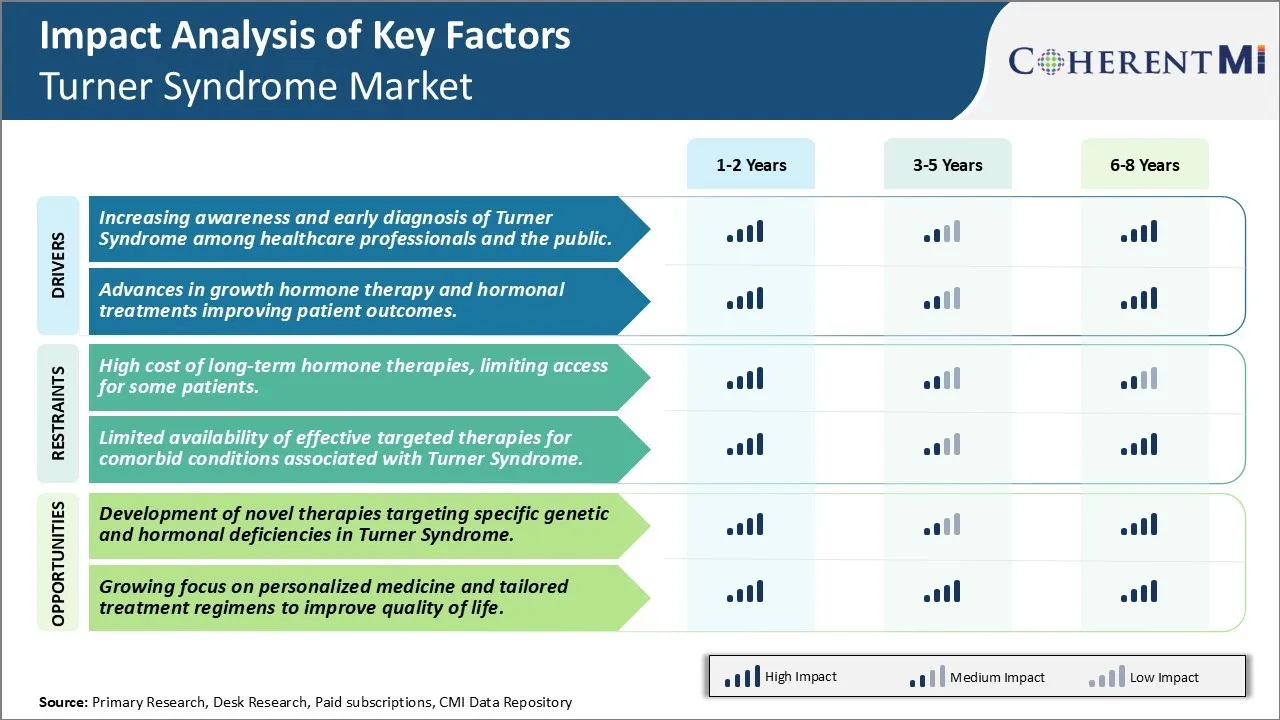Turner Syndrome Market SIZE AND SHARE ANALYSIS - GROWTH TRENDS AND FORECASTS (2024 - 2031)
Turner Syndrome Market is segmented By Therapy Type (Growth Hormone Therapy, Estrogen Replacement Th....
Turner Syndrome Market Trends
Market Driver - Increasing Awareness and Early Diagnosis of Turner Syndrome Among Healthcare Professionals and Public.
Early diagnosis and awareness of Turner Syndrome is key to provide timely treatment and improve the quality of life of patients. There have been efforts in the past few years to educate healthcare providers and general public about this syndrome through awareness campaigns. Various non-profit organizations are actively working with doctors and researchers to spread information regarding signs and symptoms of Turner Syndrome. This helps in diagnosing the condition at a very early stage.
Timely diagnosis allows doctors to assess each case individually and determine the best treatment plan. In infants and young children, growth problems can often be the first visible sign of Turner Syndrome. Regular check-ups and monitoring of growth charts helps pediatricians to evaluate if the growth is slower than normal peers. For older children and teenagers, not reaching puberty or delayed puberty within the normal age range acts as a red flag. Doctors are now more vigilant to conduct necessary tests to rule out any underlying causes including Turner Syndrome.
Public awareness initiatives have made great strides in reaching out to parents, family members and friends about Turner Syndrome. Information is more readily available online through websites of support groups and medical institutions. People are understanding the condition better which has encouraged open discussions. This helps families to deal with it in a sensitive manner. Early suspicion and timely medical advice impact the overall development of a child with Turner Syndrome.
Market Driver - Advances in Growth Hormone Therapy and Hormonal Treatments Improving Patient Outcomes.
Continuous research is expanding the treatment options for Turner Syndrome patients. Growth hormone therapy was introduced decades ago and has evolved over the years. Pharmaceutical companies are regularly working on newer formulations and delivery methods of recombinant human growth hormones. This helps closely mimic the body's natural process of growth. Sustained growth hormone therapy during childhood has resulted in significant gain in height and improved overall growth.
Hormone replacement therapy aims to address the short stature and other health issues arising due to missing or non-functioning ovaries. Low estrogen levels in females with Turner Syndrome impacts various body systems. Estrogen supplements given as pills, patches or gels effectively boost estrogen levels. This promotes normal development of secondary sexual characteristics and strong bones. Progestogen is often given along with estrogen to balance out the hormones and reduce risks of endometrial hyperplasia.
Scientific community is also studying the role of other supplementary hormones like testosterone to enhance the effects of growth hormone therapy during puberty. Combination therapies tailored to individual needs based on symptoms, age and liver functioning are showing much better outcomes than single drug regimens. Advances in treatment have enabled many patients to attain near average adult height. Overall quality of life has significantly improved with appropriate hormone replacement limiting long term health issues. Ongoing research holds promise for more effective management of Turner Syndrome.

Market Challenge - High Cost of Long-Term Hormone Therapies, Limiting Access for Some Patients.
One of the major challenges facing the Turner syndrome market is the high cost of long-term hormone therapies that are required to treat the condition. Turner syndrome often requires lifelong treatment with substitutive hormone therapies such as growth hormone injections and estrogen supplements. While these treatments are crucial for managing the symptoms and effects of Turner syndrome, they pose a significant financial burden over the patient's lifetime. The costs of long-term hormone treatments can easily run into hundreds of thousands of dollars for an individual over their lifespan. This high cost acts as a barrier for many patients and restricts access to the necessary therapies, especially for those from lower-income backgrounds who have limited or no medical insurance. The affordability challenge is a major healthcare issue as lack of access to treatment can compromise the quality of life of Turner syndrome patients and impact their mental and physical development. Addressing the financial barriers through strategies like subsidized drugs, healthcare insurance reforms and patient assistance programs is critical for the growth of the Turner syndrome market.
Market Opportunity: Development of Novel Therapies Targeting Specific Genetic and Hormonal Deficiencies In Turner Syndrome.
One of the major opportunities existing in the Turner syndrome market is the development of novel, targeted treatment approaches. Currently available therapies are substitutive in nature and treat symptoms by replacing missing hormones. However, with advances in genetic research and understanding of the condition, there is potential to develop new therapies that can specifically target the genetic deficiencies and underlying causes of Turner syndrome. Targeted therapies offer the promise of more effective and long-lasting treatment compared to substitutive approaches. The development of novel therapies such as gene therapies, RNA therapies or small molecule therapies focusing on hormonal deficiencies at a genetic level could transform management of Turner syndrome. Such innovative solutions catering to specific defects present a lucrative opportunity for drug developers and hold potential to increase treatment efficacy and patient outcomes. With further research and clinical validation, targeted therapies may establish new standards of care for Turner syndrome in the future.